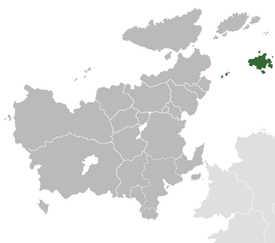Greater Blostland: Difference between revisions
No edit summary |
No edit summary |
||
| Line 46: | Line 46: | ||
===Prelude to the election=== | ===Prelude to the election=== | ||
Preceding the election of 1923 Blostland was in its darkest age, the populace had lost all hope of restoring the once mighty Kingdom after the economic crisis that was the Line Island War. This compounded by the lackluster rule of the Kingsmen would eventually lead to the political climate that allowed for the rise of Järnflotten and Functionalism. Blostland, while having a strong labor movement was still majority conservative, the farmer and business classes had essentially monopolized the political system that was born after the Vallmo Uprising creating this new aristocracy that had for a while, kept the peace. The lower class and the growing middle class however began to despise the Kingsmen and their new aristocracy, corruption and favoritism plagued the party and by 1923 it was pretty much an open secret with events such as the expulsion of David Gron from Parliament and the passing of multiple tax cuts for billionaires & farmers making massive headlines when they occurred a few years prior. | |||
===Järnflotten=== | ===Järnflotten=== | ||
Revision as of 23:38, 11 August 2023
This article is incomplete because it is pending further input from participants, or it is a work-in-progress by one author. Please comment on this article's talk page to share your input, comments and questions. Note: To contribute to this article, you may need to seek help from the author(s) of this page. |
Greater Kingdom of Blostland Storriket Blostländska | |||||||||
|---|---|---|---|---|---|---|---|---|---|
| Motto: "Med Blostland - till döden!"(Blostlandic) “With Blostland - till death!" | |||||||||
 | |||||||||
| Capital | Raudrena | ||||||||
| Common languages | Blostlandic | ||||||||
| Religion | Pure Sotirianity | ||||||||
| Government | Järnist one-party totalitarian duumvirate | ||||||||
| Anförare | |||||||||
• 1923–1935 | Karl Åberg | ||||||||
| King | |||||||||
• 1920-1935 | Oscar I (acting) | ||||||||
| Currency | Blostdlandic krona (BOK) | ||||||||
| |||||||||
| Today part of | Blostland | ||||||||
The Greater Kingdom of Blostland or Greater Blostland was the former Government of Blostland during the Great War (Kylaris)
1923 election
Prelude to the election
Preceding the election of 1923 Blostland was in its darkest age, the populace had lost all hope of restoring the once mighty Kingdom after the economic crisis that was the Line Island War. This compounded by the lackluster rule of the Kingsmen would eventually lead to the political climate that allowed for the rise of Järnflotten and Functionalism. Blostland, while having a strong labor movement was still majority conservative, the farmer and business classes had essentially monopolized the political system that was born after the Vallmo Uprising creating this new aristocracy that had for a while, kept the peace. The lower class and the growing middle class however began to despise the Kingsmen and their new aristocracy, corruption and favoritism plagued the party and by 1923 it was pretty much an open secret with events such as the expulsion of David Gron from Parliament and the passing of multiple tax cuts for billionaires & farmers making massive headlines when they occurred a few years prior.
Järnflotten
The soft coup
Government
Järnist functionalism
The monarchy
Church and state
Society
Economics
Politics
Religion
Military
Goal of imperialism
In euclea
In asteria superior




